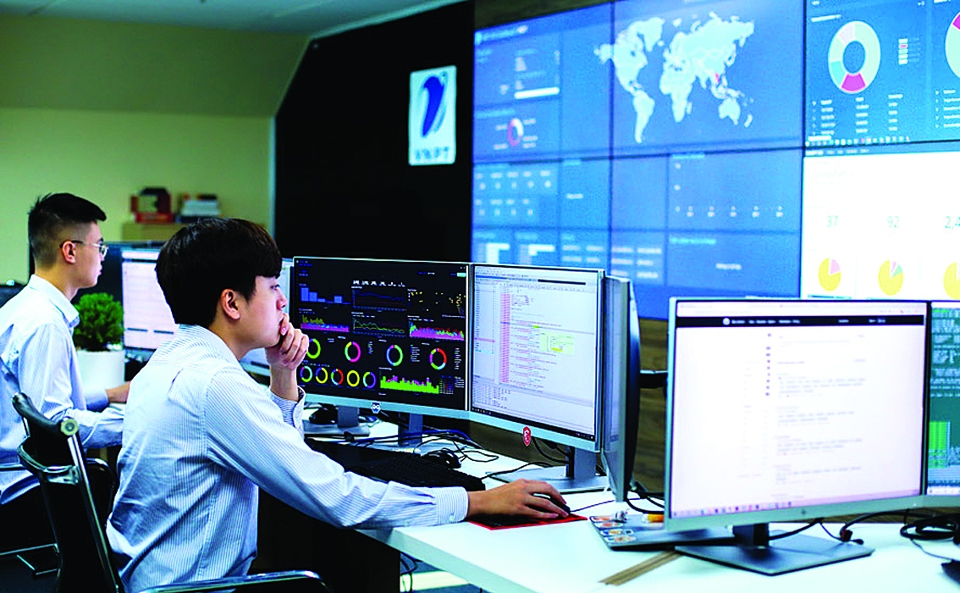Hanoi committed to start-ups and innovative enterprises development
Hanoi will take drastic measures to accelerate the expansion of start-ups and innovative businesses
Hanoi needs to endorse young businesses and entrepreneurs’ development as they are among the key drivers of Hanoi's future growth.
| Digital platform in use at a Hanoi-based enterprise. Photo: The Hanoi Times |
Hanoi is home to some 1,000 start-up and innovation businesses, representing 26.3% of the country's estimated 3,800 enterprises.
The city also has 32 incubators (38% of the national total) and 14 business accelerators.
Since 2016, Hanoi-based startup and innovation businesses have launched 100 fund-raising deals and mobilized about US$1 billion worth of investment.
Globally, governments have taken steps to encourage the growth of local startups, as they provide technological tools to the economy and will soon become market makers in the future.
In Vietnam, startups and young entrepreneurs are seen as full of potential, and local authorities are said to be doing their best to support their business operations.
Nguyen Quoc Ha, deputy director of Hanoi's Department of Science and Technology, said the Vietnamese Government had made the development of science and technology one of its priorities until 2030.
"Science and technology are the drivers of economic growth, productivity, quality and efficiency," he said.
"Innovation solutions also enable the nation, provinces and cities, and all economic sectors to increase their competitiveness, find the root of national digital transformation, raise people's living standards, and ensure national defense and security," Ha said at a workshop held during Hanoi Techfest 2023 last week.
Hanoi leads the country in accelerating science and technology companies as it is home to more than 150 innovative businesses focusing on information and telecommunications, agricultural biotechnology, health, and original materials, he added.
"The capital aims to establish 200 science and technology companies by 2025. These companies will create the momentum for the city's growth, and we will make further attempts to support their progress."
Nguyen Anh Tuan, another deputy director of the department, said that once the National Assembly approves the amended Capital Law, it will pave the way for the city to attract more high-tech investment projects.
"The amended Capital Law should include provisions that allow Hanoi to allocate more public spending to universities, research institutes and technology projects. The achievements of these institutions will benefit the city, the capital region, and neighboring provinces and cities."
Ngo Minh Toan, Director of the Support Center for Enterprises under the Hanoi Department of Planning and Investment, said that the city government is always concerned about start-ups and small and medium-sized enterprises.
Every year, many new businesses are set up in Hanoi, and training courses are organized to help them train employees, which has reached about 10,000 so far, he said.
"The city has also issued several policies to accelerate the digital transformation of SMEs, expecting both SMEs and startups to seize the opportunity to improve their performance and operations," Toan said.
People as the key
Human resources, or manpower, are considered the most important factor in the development of a startup business.
Le Tan Hung, director of the Center for Technology Support, Research, Development and Transfer under Hanoi University of Science and Technology, said quality human resources are a must for the success of any business, especially a startup.
"Every year, about 8,000 students graduate from the university, and 1,200 of them specialize in information and technology. Our training program is always updated with the latest technologies in the world," he said.
"Technologies are constantly changing, and their changes can reshape the world in an instant. Therefore, young students need to understand modern technologies to start their entrepreneurship," he said.
Nguyen Trung Dung, general director of the university's BK Holdings, said Vietnam's startup community is very young and there are many obstacles.
He said that startup companies should grow within local universities to take advantage of available outcomes in scientific and technological studies.
Such a method, he said, will help Vietnamese and Hanoi-based startups grow, improve their innovative capacity, and serve socio-economic growth activities in the city and the whole country.
"It requires proper steps by the government and universities to form an ecosystem consisting of universities, enterprises, and research institutes," he said.
Dao Quang Thuy, head of the Office for Science and Technology Business Incubation and Acceleration at the Ministry of Science and Technology, said startups and tech companies now enjoy some incentives in taxes, loan rates, and land rent.
The ministry is working on amendments to the Law on Science and Technology, he said, adding that the ministry will soon finalize the draft of the amended law this year to lay the foundation for science and technology businesses.













